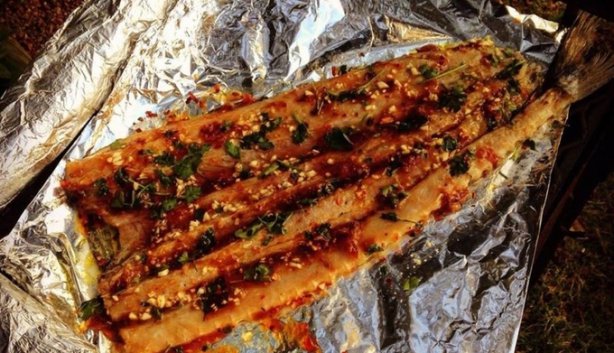![]() Corporate getaway for big and small ...
Corporate getaway for big and small ...
One night free at this this fully-catered retreat in Winelands





| For Moments of Joy. Follow our social channels for useful news, daily local champions | |
 | 072 350 2062 |
 | Ideas Cartel, The Old Foundry, 1 Sand Hill Road, Green Point |
 | www.capetownmagazine.com/subscribe |
 | now@capetownmagazine.com |
 | CapeTownMag |
 | CapeTownMagazine.com |
 | capetownmag |
A classic snoek braai recipe supplied by Jan Braai, as published in his 2011 cookbook, Fireworks.
Last Updated: 26 March 2018
Is there anything more South African than a braai? Unlikely. Is there anything more Capetonian than a snoek braai? Highly unlikely.
WHAT IS SNOEK?
It is one of the Cape’s most popular exports, growing up to 2m in size. Snoek form schools near the bottom of the ocean or in midwater, and prefer water temperature between 13° and 18°C. Although it's a treat to buy this fish fresh, snoek freezes well and is available all year round. Snoek can be baked, poached, fried or smoked, but the traditional way to serve it is grilled over the coals with boiled sweet potatoes.
WHERE CAN YOU BUY IT FRESH?
In Cape Town snoek can be purchased at most working harbours, including, Kalk Bay harbour, Hout Bay harbour or Granger Bay harbour. Snoek can also be found at Texies in Sea Point and at Texies at the Cape Town station. In season, fresh snoek is also available at many local supermarkets.
BEST PRACTICES FOR A SNOEK BRAAI
There is a constant risk that the fish will stick to the grid, so gently shake whichever side of the grid is on top at any stage of the braai to loosen it from the meat.
Serve the snoek skin side down, flesh side up.
It can be dished up using a spatula. Break rather than cut through the snoek (as you would for example do with a pizza) as cutting through the snoek would also cut the bones into smaller parts, which can get stuck in your throat. Normal uncut snoek fish bones are quite large and you will easily spot them.
Snoek is best served with a side of soetpatats, which when translated into English are sweet, sweet potatoes.

But let’s hand the word over to the braai-master, Jan Braai.
"Once you have mastered what follows below it stands to reason that you will experiment and develop your own special way of braaing snoek using this as a foundation."
INGREDIENTS
1 fresh snoek
Olive oil
Salt
Pepper
150ml apricot jam
100ml butter or olive oil
Juice of 1 lemon
4 chopped garlic cloves
25ml soy sauce (optional)
50–100 ml white wine (optional)
Dash of chili sauce (optional)
METHOD
1. When you buy your snoek, ask for it to be cleaned and for the head and tail to be cut off.
2. When starting the actual snoek braai process at home, wash the snoek under cold running water (be sure to save that water to use in the garden or to flush the toilet).
3. Now the snoek needs to be dried. This can be done in one of three ways:
By hanging it in a cool area with a draft blowing over it. Hanging up a snoek is not always easy if you don’t live in a fisherman’s village on the West Coast so an easy way of hanging the snoek to dry is by already putting it in the grid that you will be braaing it in, and hanging the grid on a hook in a cool place with a slight draft, for example under a tree.
By salting the snoek with coarse sea salt that will absorb all the water.
By blotting it with paper towels.
Whichever of these methods you use do make sure that flies cannot make a pre-emptive strike and that your snoek has some defence system against aerial attacks.
4. Using a small pot on the fire, or on a stove, lightly fry the chopped garlic in butter. Then add the apricot jam and lemon juice. If you want to add some of the optional ingredients, do so now. Heat and stir until everything is melted and mixed.
5. If you salted the snoek in step 3, you now have to shake off all the course sea salt. Most of the big visible pieces need to be shaken off as a tooth can be broken on them. Obviously some of the salt would have transferred onto the snoek so keep this in mind when adding extra salt in one of the next steps. This 'pre-salting' of snoek with coarse sea salt is loved by some and hated by others. You need to test whether it works for you.
6. A snoek should be braaied 'open'. Smear the skin side of the snoek with oil so that it does not stick to the grid and now place in the grid, skin side down. There are two ways:
Straight onto the grid. Coals will need to be slightly gentler as the skin may burn easier. More heat goes straight into the fish as it will not be deflected by the foil. You definitely need to pay more attention and make sure you don’t burn the fish. The skin side of the fish will end up slightly crisper.
Foil on grid and fish on foil. Coals can be hotter as the foil protects the fish from getting burned. Another advantage of doing it on foil is that you can fold up the sides of the foil, which saves any basting and sauce that runs off the fish. The fish will then partly 'boil' in the sauce (a good thing). Fish braaied on foil is also easier to lift completely onto a serving tray still on the foil.
7. Grind salt and pepper onto the flesh side of the snoek and lightly pat it onto the meat.
8. Braai time: Whether you are using foil or whether the skin side went straight onto the grid, a snoek should be braaied for about 15 minutes in total. This time can slightly deviate depending on the heat of the coals, the height of the grid and the size of the snoek. The skin side of the snoek will be down for about 80% of the total braai time. You can test whether the snoek is ready by inserting a fork in the thickest part and slightly turning the fork. If the flesh flakes, the snoek is ready.
When braaiing with foil I would braai 10 minutes skin side down, three minutes flesh side down (and during this time remove the foil from the skin side) and then a final two minutes skin side down to brown the skin.
When braaiing without foil I would go 12 minutes on skin side and then turn and give three minutes on flesh side to brown it. There is a far greater risk of burning the snoek here, so you may also want to turn it more often. If you do, then you need to baste it after each turn, so make sure you have enough basting sauce by adding the white wine, or simply increasing all the ingredients of the basting sauce.
9. Basting the snoek: The basting should happen during the time that the flesh side is up. Use a brush or simply drip it onto the fish with a spoon. You can baste as often as you wish until all the basting is used up.
---
Learn how to make 3 traditional Cape Town Easter recipes.
Taste your food, not the toxins with these coffee-based firelighters.
Tractor rides, roosterkoek and kids fun while celebrating apricots at the Appelkoos Fees.
In search of more Easter-themed recipes? Look no further than our Pickled Fish and Hot Cross Buns recipes.
Plan your long weekend with this overview about things to do this long Easter weekend.
Learn more about what Easter Sunday and Family Day are all about.
We don’t only bring you the best braai-spots in Cape Town but also much more around enjoying Cape Town. Enjoy our monthly free newsletter and connect with us on Facebook and Twitter.
![]() Corporate getaway for big and small ...
Corporate getaway for big and small ...
One night free at this this fully-catered retreat in Winelands
![]() The hidden seaside bistro on the ...
The hidden seaside bistro on the ...
Inventive small plates best explored with a wine pairing
![]() Reasons to visit this beach-side family ...
Reasons to visit this beach-side family ...
DIY waffles, loaded hotdogs, poke bowls, right on the beach
![]() Brewery with food specials (almost) ...
Brewery with food specials (almost) ...
Daily specials on comfort meals like burgers and schnitzels
![]() Meet 100 bronze life-size figures at ...
Meet 100 bronze life-size figures at ...
From famous heroes like Mandela to forgotten ones like Autshumato
![]() Cape Town accommodation special for a ...
Cape Town accommodation special for a ...
20% off, free breakfast, access to rooftop pool
![]() Team building, stylish conferencing & ...
Team building, stylish conferencing & ...
Ultimate work-play-and-stay hub, Trail’s End
![]() Accommodation special at Cederkloof ...
Accommodation special at Cederkloof ...
Book for 4, pay for 2. There’s hot tubs, hiking trails, pools…
![]() Shimansky Diamond Experience at The ...
Shimansky Diamond Experience at The ...
The diamond showroom where you can polish your own stone
![]() Ficks, Hermanus’s tidal pool ...
Ficks, Hermanus’s tidal pool ...
Just as wonderful at night & during the cooler months
![]() The café creating space for ...
The café creating space for ...
It’s hidden in Hermanus. Here’s how to find it